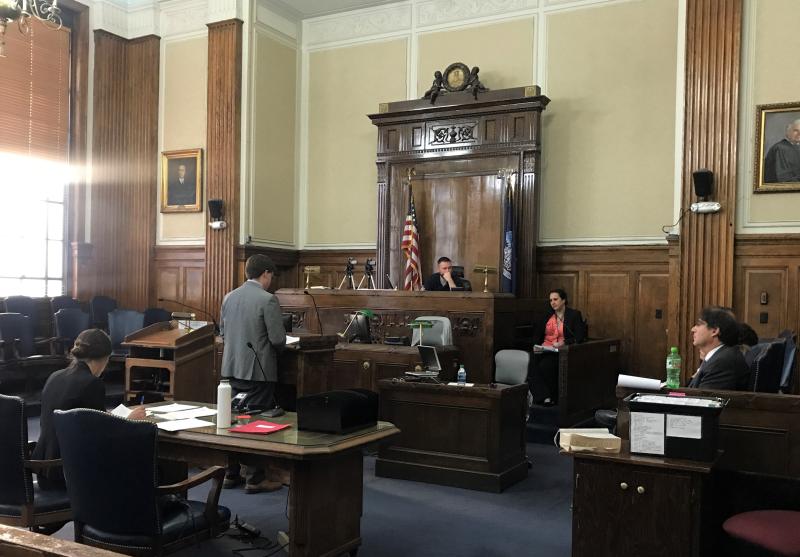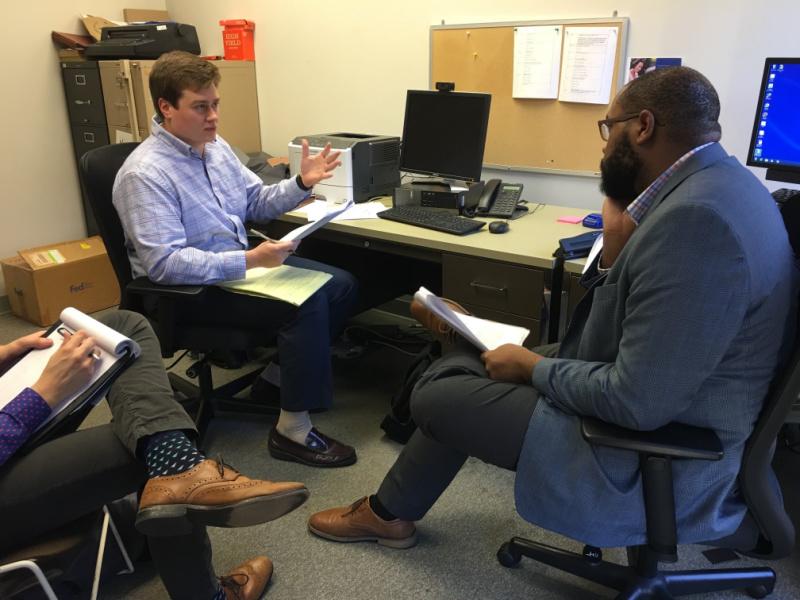Partnership between the Criminal Justice Clinic and Tulane psychiatrists helps students and clients
Estimates suggest that at least 25 percent of people in jail suffer from serious mental illness, and understanding how to recognize and address the issue in court is an important skill for lawyers and judges working in the criminal legal system.
Ensuring that Tulane Law students are learning this skill was the genesis of a longstanding partnership between the Criminal Justice Clinic and the Tulane School of Medicine’s Psychiatry Department.
Since 2007, the interdisciplinary training program with the Forensic Psychiatry Department at Tulane University School of Medicine has trained scores of law students who have worked together with doctors in the forensic psychiatry fellowship program to prepare a mock case involving a defendant’s competency to stand trial or to raise an insanity defense.

mock trial.
Both sides benefit from understanding the different professional approaches to the courtroom experience and how to effectively work together.
At the annual mock hearing, the forensic psychiatry fellows serve as experts and the law students assume the role of defense or prosecution. In advance of the trial, the students meet with the fellows to consult and prepare for the expert testimony. They prepare to qualify the fellow as an expert, learn about the strengths and weaknesses of their position, and help the fellow prepare to be cross-examined. After the mock trial, which is held at the courthouse, the law and medical school faculty provide critique to students and fellows.
“This has been a very successful program for both schools,” said Criminal Justice Clinic Director Katherine Mattes.
"It is a unique opportunity for clinic students to work with an expert, learn how to lay a foundation, how to prepare for presenting expert testimony, and how to prepare and execute an effective cross-examination of an opposing expert - all litigation skills that translate beyond the field of psychiatry or even criminal law," she said. "For the fellows, it gives them an opportunity to learn how to testify effectively, how to express their professional opinion with authority and clarity, and how to handle a challenging cross-examination."
Recently, the now 15-year-old partnership has expanded to include fellows from the newly established Forensic Psychology fellowship program, said Mattes. Prior to the exercise, Tulane student attorneys receive training on understanding psychiatric illnesses from a member of the Tulane University School of Medicine Department of Psychiatry and Behavioral Science’s faculty. This lecture helps them to recognize behaviors that might prompt them to raise mental competence or the insanity defense, and to understand some of the diagnoses and other terminology used in psychiatric reports.
The work that the students do in this mock exercise has informed the work on behalf of real clinic clients:
- Since 2011 clinic students have represented a client who was acquitted by reason of insanity and has been committed to a mental hospital. At subsequent hearings, the students worked with experts in forensic psychiatry to argue in favor of moving the client to progressively less restrictive settings.
- Clinic students have called experts in forensic psychiatry at proceedings for clients who were juveniles or young adults at the time of their crimes. At these hearings, experts were introduced to talk about adolescent brain development as mitigation for sentencing and parole hearings.
- In another recent case, clinic students called an expert in forensic psychiatry to describe how growing up in a violent neighborhood led a client to become hyper-vigilant to threat and impacted the client’s assessment of the danger he faced.
The partnership with the forensic fellows has also helped make student attorneys and the forensic fellows practice-ready.
Alumna Mandy Morgan (L’20), who works in Orleans Parish as a Public Defender, says she uses these skills regularly both to help clients and to inform the bench about the legal and psychiatric issues presented in these types of cases.
“My experience with the forensic psychiatry partnership benefitted my clients and my practice tremendously,” she said. “Three years later, I am continuing to apply the tools gained through this partnership in my position at the Orleans Public Defenders, informing judges of the potential psychological distinctions our city’s most vulnerable must overcome due to their particularly challenging backgrounds.”
Dr. Jeffrey Nicholl, who completed the fellowship program in 2012 and then participated as faculty, attributed the mock hearing exercise with making him “much more comfortable dealing with the lawyers and their questions, particularly if they were hostile." Nicholl noted students were often much more prepared than the experienced lawyers who questioned him in his later practice.
Working with experts is a critical part of litigation practice and requires a specific skill set. The partnership between the Criminal Justice Clinic and the Forensic Psychiatry Department gives Clinic students the chance to develop those skills with real experts and at the same time raises their awareness of the legal and practical challenges presented by defendants suffering from mental illness.

